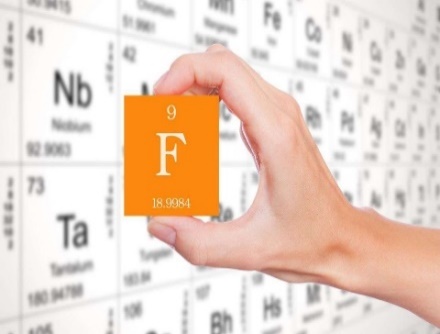The role of fluorine in the human body

Fluorine is one of the important trace elements that the human body needs. Consumption of fluoride more than the physiological norm can have a toxic effect. At the same time, the lack of fluoride, leads to serious violations of normal body functions
Fluorine is contained in soils, rocks, which dissolve and pass into natural waters. The concentration of the trace element in water depends on its presence in nature and may be different in each region. Fluoride enters the body primarily with drinking water (1-1.2 mg) and 4-6 times less - with food. Its absorption in the body depends on the dose of consumption and the solubility of the fluoride-containing substance ingested. Soluble fluorides are almost completely absorbed by the walls of the gastrointestinal tract. Biological effects on the body, it is the formation of tooth enamel, bone tissue. Fluoride quickly spreads and accumulates in bones, teeth and its concentration depends on the state of bones, sex and age. The absorption of the trace element also depends on the efficiency of kidney function.
Daily need for fluorine:
- children - 1.0-3.0mg/day;
- adolescents - 3.0-4.0mg/day;
- adults - 4.0 mg/day.
- to the development of caries - the main sign of hypofluorosis, because in the absence of fluorine, oral bacteria synthesize acid from sugars more quickly, which damages the hard tissues of the teeth
- disruption of calcium fixation in hard tissues, which leads to a decrease in the strength of bones and teeth
- decreased iron absorption, hair and nails become brittle.
- decreased immunity, the body becomes more vulnerable
The use of fluorine toothpaste is considered as an individual preventive measure. Fluorine protects teeth from caries and enamel from damage.
It should be noted that the abuse of fluoridated products, consumption of water with fluoride from 20 mg per liter leads to the development of diseases.
High levels of fluorine over a long period of time, can be harmful to humans and can lead to:
- deformation of teeth, discoloration of enamel, bleeding and brittle teeth
- impaired skeletal development
- formation of bone growths and joint stiffness.
Fluorine can aggravate kidney disease, diabetes and hypothyroidism.
How to prevent dangerous exposure to fluorine compounds if the water is treated with fluoride:
- to avoid cooking food in aluminum cookware, as fluoride binds to aluminum and forms a dangerous compound with it.
- to limit the consumption of tea made with tap water, as the tea already contains high levels of fluoride (use a filter).
- to avoid drinking tap water, especially for pregnant women and when cooking with small children.
- to exclude drinks such as sodas or colas if they are not labeled "fluoride-free".
- to control the use of tap water for watering the vegetable garden, as sodium fluoride accumulates in the soil and, consequently, in vegetables.
IMPORTANT!
Be careful with fluorine: it is advisable to know the content of fluorine compounds in the water of your place of residence; if you frequently drink mineral water, pay attention to the fluorine content; use dental hygiene products with fluorine strictly according to the dentist’s recommendations.
You can take fluorine as a pharmacy drug only after a doctor’s prescription and after a blood test.




